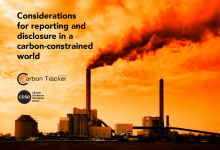Considerations for reporting and disclosure in a carbon-constrained world
 Hot on the heels of a historic climate deal in Paris the Carbon Tracker Initiative and the Climate Disclosure Standards Board, two non-profits who seek to promote transparency in relation to climate risk, will in Davos launch proposals for risk reporting by fossil fuel companies. The Paris accord confirmed the commitment of global leaders to limit dangerous warming to below 2°C but also promised to pursue an even stricter 1.5°C target, adding more pressure for companies, investors and regulators to act. The ‘Paris effect’ reinforces the political and market signals emerging that will aid the transition to a climate-resilient, low-carbon economy and some actions have already been taken to realize that goal. These include, for example, the announcement at COP21 by Mark Carney, Governor of the Bank England and Chair of the Financial Stability Board, that Michael Bloomberg will head a new global Task Force on Climate-related Financial Disclosures (TCFD). The TCFD is intended to be an industry-led body that seeks to identify and set out the information the capital markets and other stakeholders need to manage the transition. This paper is designed to assist the TCFD members in assessing the ‘carbon bubble’ concept and ‘stranded asset’ risks inherent in the business-as-usual strategies of many fossil fuel companies.
Hot on the heels of a historic climate deal in Paris the Carbon Tracker Initiative and the Climate Disclosure Standards Board, two non-profits who seek to promote transparency in relation to climate risk, will in Davos launch proposals for risk reporting by fossil fuel companies. The Paris accord confirmed the commitment of global leaders to limit dangerous warming to below 2°C but also promised to pursue an even stricter 1.5°C target, adding more pressure for companies, investors and regulators to act. The ‘Paris effect’ reinforces the political and market signals emerging that will aid the transition to a climate-resilient, low-carbon economy and some actions have already been taken to realize that goal. These include, for example, the announcement at COP21 by Mark Carney, Governor of the Bank England and Chair of the Financial Stability Board, that Michael Bloomberg will head a new global Task Force on Climate-related Financial Disclosures (TCFD). The TCFD is intended to be an industry-led body that seeks to identify and set out the information the capital markets and other stakeholders need to manage the transition. This paper is designed to assist the TCFD members in assessing the ‘carbon bubble’ concept and ‘stranded asset’ risks inherent in the business-as-usual strategies of many fossil fuel companies.
